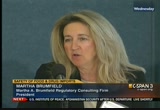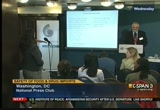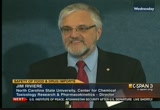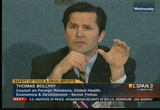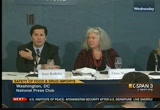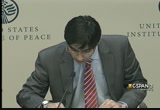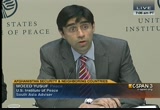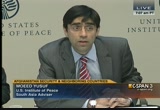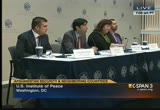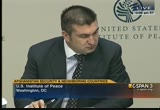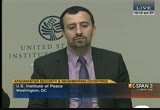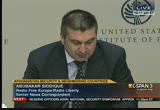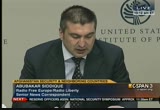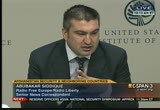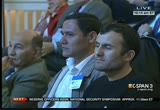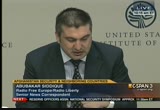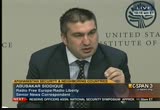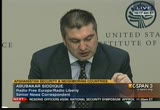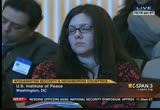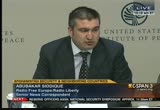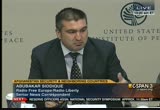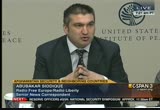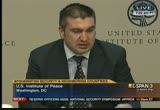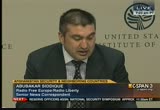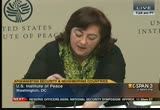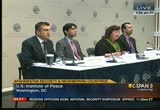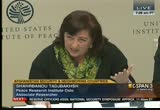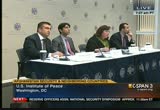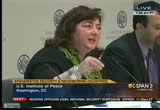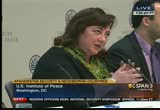tv [untitled] April 6, 2012 10:00am-10:30am EDT
10:00 am
from the committee. i would just like to add we have to be mindful of the flip side of the issue. we were asked what things congress needs to undertake but one thing that was very important tore this committee is that this is not a u.s. problem. this is a global problem. so, even simple things like sharing inspection reports, there might be laws in european countries in canada and japan that also prevent share. there needs to be a mechanism to influence the regulators in other countries to make this a two-way dialogue. >> which is why our first recommendation is to bring this to the g-20 agenda to get everyone on the same page on that. >> to build on jim and martha and claire's good point, this is why is this committee took such great efforts to family size that there is as intersection of global health, trade and development on these issues. that operates both internationally and why this should it be important at the g-20. it's not just about public
10:01 am
health. it also should operate domestically as well and we're hopeful that that allows the ability to bring together all the necessary partners that you need to bring to bear on this problem. >> and thanks very much. once again, if you would like to ask a question please press star one. >> yes. >> hi, i'm lorn becker. i'm sort of curious for the sort of second set of recommendations the u.s. government that were very c.l.e.a.r. actors and for some of the first set there were as well but i'm curious because the challenges in developing country regulators they're not waiting for an iom report to tell them they should communicate more with each other. i'm wondering who you see as a driving force particularly for that recommendation but for the other international
10:02 am
recommendations, as well. >> essentially, what we're looking at is again, the agenda is bringing on the g-20 agendas to get to u.s. and other areas on the development organizations and the world bank and various other groups to essentially put strengthening regulatory infrastructure as a priority in anything going forward to start getting that message out. so our tie-in with the domestic regulations at fda bring this forward and the question on congress, bring this forward as new approaches to improve public health go forward, there is a realizization for thars to have a lasting and multiplier effect within those countries that essentially the regulatory structure needs attention. >> i think that's right. i mean, we call for basically the g-209 to endorse this as intersection of global health, trade and development. and with that endorsement what we'd like to do next or what we recommend doing next is that this then filter down to the various international agencies that are dedicated to those
10:03 am
issues. and you know, of course, there's wto and it's committees that work on these issues, there's codex, all the regional development banks we think supporting strong regulatory systems. again achieves both global health trade and development outcomes and who has activities in this as well, but again, we're looking for alan doorsment hopefully at the next meeting of the g-20 which will be in mexico of the intersection of these issues and then to start to build down from there to these topic specific international organizations. >> it's martha brumfield. if i could add onto tom's point, my experience and, of course,s disagree please speak up was that the regulators with whom we were interacting in the countries were very enthusiastic about this initiative and anxiously awaiting the report.
10:04 am
so the i think there is a lot of receipt activity on the part of many of these regulatory agencies. so it's not just for g-20 to push it, although i think this is incredibly important but there can be other mechanisms maybe softer, one-on-one type of approaches where there would be a lot of receipt activity with the agencies in the developing countries. >> and i think we can be -- one of the things we recommend here is international standards to make it easy for them. one of the things we found, we did, as you mentioned a lot of field visits as part of this committee and we often found strong regulatory systems in the areas that support products for export. that don't necessarily extend to the population at large. and there is a lot we can do both the u.s. specifically by doing more to support international standards and the participation of developing country agencies and their development but also internationally to make this easier for those countries to
10:05 am
adopt internationally compatible high standards. >> and ultimately you would want spillover effects so it wouldn't be just towards the export market. so would be improving the health and safety of food in the developing countries and i think there is -- >> you can watch this event anytime at our website as we take you live now to the u.s. institute of peace here in washington. this morning they're hosting a discussion on the 2014 security transition in afghanistan. panelists will also look at the role of neighboring pakistan and iran. you're watching live coverage here on c-span3. >> by the afghanistan, pakistan program at usip and usip is involved on the ground in afghanistan and pakistan to promote nonviolent means of resolving conflicts and we've got a fairly sizable programmatic presence in afghanistan and less so but still modest sized presence in
10:06 am
pakistan, as well. but in addition to our programmatic work, we do under pin up of what we do in these countries by our analysis and afghanistan, of course, the impending transition there in 2014 remains very important for us. not only in the sense of looking at u.s. policy and what is happening within afghanistan, but also the broader region and the implications regional policies have for their all-important country. and one of the things we do is use our convening powers as an institute to bring together experts to talk on those issues and today is a great example of that. i may also mention another example which is an upcoming event on april 10th on the prospects for peace in afghanistan where ambassador marc grossman who is the special rep on afghanistan and pakistan will be speaking here and steve hadley, former national security
10:07 am
adviser to president bush will be moderating the event which will also feature ahmaad rasheed and ambassador omah samed who is based at usip. please join us for that event, as well. today's event focuses on what is often touted as the regional solution to afghanistan. every time weep start talking afghanistan and how relative peace and stability can come to it, you'll hear the term regional solution, and yet, there is not much work done on what really regional architecture means, what it looks like. what to begin with are the interests, the positions and the strategies of countries that neighbor afghanistan? and whether, most importantly, there are overlaps in their positions which can be harnessed and leveraged to bring together a form of a regional solution. can the u.s. and other parties
10:08 am
incentivize behavior on the part of these countries to make that happen because the conventional wisdom is that if the region doesn't come together by the time the transition happens, more than likely there will be a destabilizing influence coming from outside of afghanistan's borders. so to discuss these issues today we are very fortunate to have a an eminent panel sitting here in front of you, three experts who have truly studied this issue for a long time and who will be speaking to us today. just very quickly in terms of format and i'll introduce them briefly, the full bios are outside available on the desk, we'll have each speaker speak for about 15 minutes. after which we will open it up for a question and answer session and we'll have a good 40 minutes or so for that. we'll be covering afghanistan's image at neighbors today. pakistan, iran and the
10:09 am
neighboring central asian republics. we will be speaking in the order of mr. abu sadek, a senior correspondent for radio free europe and radio liberty central newsroom based in prague. he spent the past decade researching and writing about security, political, humanitarian and cultural issues. in pakistan it, in afghanistan, and most importantly in the bordering region of fatah. and he co-authored a report with plaintiff ruben, one of the early analysis of the pakistan, of afghanistan dynamic when it came to peace in afghanistan. he'll be followed by miss cher who teaches a program as part of the masters of political affairs in paris. she's also a research associate with the peace research
10:10 am
institute of oslo and is doing some very interesting it research. case studies on south asian regional security complex and afghanistan and the central asian regional security complex as a whole. this would it be very interesting i think when it comes out, has written extensively and also spent time with the u.n. in a previous life or the same one. mr. ali rosanada is based at the rand corporation as a senior are international policy analyst. and was the lead co-author of coping with a nuclear rising iran. iran continues to feature in the headlines here and at the center the for naval analyses, is a graduate of george washington university. i want that thank all of you for joining us here. the last reminder i would not be
10:11 am
fulfilling my duty of sitting here if i didn't ask you to please turn off or put your phones on silent. importantly because we are being covered live this event is going on air live and we also webcast such events so there are audiences in south asia also watching this and sometimes the technology interferes with that. so with this, let me turn it over to abu baka to begin the discussion. >> we thank you very much. thanks for inviting me and it's very good to come to your new office. i think we have finally found a home in washington. >> whatever i'll say today will be my views. and the main aim of the talk is to highlight in my view an alternative perspective, because there is a lot of criticism of pakistani policies in afghanistan and pakistan.
10:12 am
my effort has always been top identify areas where there can be reasonable cooperation and it can bring stability to afghanistan but where particularly pakistan can benefit from that peace and won't be paranoid about a stable afghanistan. a few days ago, i was reading a book that was written in 1930s by somebody called sayed sue la man nadavi, then an indian writer. of course, he became a pakistani and he the famous poet and another person ross masud, they traveled to afghanistan in 1930s when nadr han was the king. it's a very interesting account of a jurnfry from peshawar or lahore to kabul and then down south to kandahar.
10:13 am
and the view is very interesting because it's a view of afghanistan is an inspiring place for the muslims of india because this is -- i mean along with turkey, the only independent country that's free of western colonization. compare that to today's views, today's view of afghanistan or particularly pakistani policymakers, people who matter, people who really make pakistan policy. there's a grand contrast. what will in my view, what i'll call pakistan's policy or the past 30 years there's a continuation, the continuation is that for pakistan, pakistan's policy was always what i will call an afghanistan first policy. here is a country which has very good prospects of succeeding in human development and being a regional leader in being a model. and also a country that has
10:14 am
tremendous challenges, 180 million people, half of them still illiterate, the health care, i mean we have still in areas in pakistan like fatah or fa luge stan which are comparable in terms of development to sub-saharan after. the country has been obsessed or the security paradigm has been obsessed with fashioning the outcome in afghanistan to what people thought were you their advantage to their liking. and that has, i think, created a number of problems both domestically and in pakistan has undergone this transformation from being a peaceful kind of relatively liberal and tolerant society to a society where there are new conflicts almost every year in just look at the domestic -- the ethnic issues in
10:15 am
pakistan now and also look at the sectarian issues, the shia/sunni conflict and it also has an impact in afghanistan where pakistan has made climbs but very few. this is despite the fact that most afghans who are alive today have some kind of experience with pakistan, a lot the of afghans have lived in exile in pakistan. most afghans in their lives have somehow traveled to pakistan to meet relatives, participate in a marriage, whatever. and yet, if you talk to -- and i've done this, frbs uzbeks to that jeks to pastuns to hazaras, one thing that most after gabs agree on is the policy that pakistan has not done good to us although pakistan hosted them, they're grateful for them, pakistan also -- and this is because that pakistani model was
10:16 am
more, it was different from other neighboring neighbors interference or -- the pakistan mic managed the afghan scene. the other players helped, for example, if iran helped somebody they never really pushed them to align with somebody domestically or whatever their domestic politics was. if mehsud wanted to ally with somebody, iran was not really pushing for it but in pakistan's case it was very different. and that has also in might opinion created a confusion about what pakistan actually wants in afghanistan like in 2006 wx the people that moid pointed to, our conclusion was that there is this is big pastun problem. the pastun rulers of afghanistan had never recognized the line and you can bring in peace if the afghans are recognized duran
10:17 am
line as perhaps a soft border and there can be two countries at peace with a recognized border and there can be reasonable cooperation and all that but i'm not sure if that is the scenario because one word that i find very problematic is the word end game. it's a misnomer. this is a country of 30 million people. you can't play end games with a country of 30 million people. today, when i look at pakistan's policy in afghanistan, one thing is very clear that are pakistan wants an india-free afghanistan or at least an afghanistan where there is less indian influence and where india is not in a way the major strategic partner of afghanistan but look at -- if you look at recent history, all the regimes who were kind of left to themselves and
10:18 am
particularly this is very true now about karzai government, nanl i buhl la in 191289 really went very close to india and india also played a major role in sustaining him for the next three years. the same is true today in afghanistan and india has a strategy agreement and pakistan could have prevented that by what i pointed to earlier, by making friends, not just clients in afghanistan. and pakistan has a tremendous in a way a tremendous constituency to appeal to afghanistan because of all afghans are exhausted. all afghans are sick of and tired of fighting. and they want some kind of peaceful settlement p-but the key to that settlement and most afghans that i talk to is in the
10:19 am
hands -- not in the hands of the u.s. ironically but in the hands of pakistan. and there comes in the whole issue of reconciliation. pakistan's role, pakistan's kren tralt in the reconciliation. there will be no intra-afghan reconciliation unless pakistan actively helps. we know that prime minister are made a very good statement that's a very good positive development and i was in pakistan in january for three weeks and i heard a lot of positive talk about a new beginning, a changing pakistan. and that thing. but we really have to feel the effects of those changes. and that can only happen if we feel an active push from pakistan to reconcile some of the factions, and there are a lot of them. haqqani, some other commanders in eastern afghanistan and also
10:20 am
of course, to reconcile with afghanistan and it will be a painful process, a difficult process. it will also address the interests, it has to address the interests of other neighbors of afghanistan, but pakistan is really the key to this. and in a peaceful afghanistan, pakistan will be the main beneficiary. just consider that today there are like half or at least half close to half of the population of afghanistan is pastun. and pakistan has a large pastun minority, maybe 30 to 35 million. historically, most of the pastun political movements and most of the intellectual movements were based on the pakistani side. so the afghan pastuns still look toward afghanistani pastuns for leadership. there is the leadership to leadership contact. every month karzai writes a letter to a leader in
10:21 am
afghanistan. if pakistan is a state involved its own pastuns in afghan reconciliation, that would be a tremendous break through. but we shouldn't forget about the hard-core innovate strategic military analysis which i think is not entirely wrong because pakistanis it look at an afghanistan where the americans are now rapidly training hundreds of thousands of armed men, and i think people in islamabad have very strong doubts about the sustainability of that military. just consider that in recent times, afghanistan has like a regular military -- a regular police force, but it also has a lot of irregular forces like just the whole, all the security guards have now been turned no into what is called the afghan protection force, 20,000, 30,000 people with guns and pakistan
10:22 am
has seen that these these people, i mean then kind of military force can easily turn into militias and then of course, pakistan has to deal with it, but this should not give pakistan and i centive to invest in only in some kind of militant groups or extremist groups. it should also give pakistan an incentive to do more human development to understand afghanistan better and to -- and to promote peace among afghans. basic point that pakistan can do and begin with is to just simply leave afghans to resolve their differences. it doesn't matter, it shouldn't matter to afghanistan if karzai's ruling afghanistan or tomorrow mullah omar or anybody will, rabanni's son abdullah is elected by afghan people to rule afghanistan. it shouldn't be a problem, but
10:23 am
the key to a sustainable peace will be where in my opinion where other neighbors come in is to build a peace economy and pakistan again is the key to it. if you look at pastun economy in both afghanistan and pakistan, it is most of it is trade and transport. and what you need to for trade to prosper and for transport sector to grow? you need peace. a pastun driver, most of the trucking industries also manned by pastuns. so it can have many forms, for example, the whole silk road thing or like south asia, central asia, iran connect. pakistan already has tremendously benefited from the economic boom in afghanistan in the past ten years. it's just a matter of policies. and one last point, pakistan also has to do maybe painful but
10:24 am
really necessary reforms, internal reforms which will greatly affect the situation in afghanistan. and fatah is on the top of those reforms. we know that pakistan has introduced some reforms but those are not enough. pakistan need to fully integrate fatah into its mainstream. thank you. >> thank you, thanks a lot. also for stick together time. so you set a good precedent here. may i now turn to miss patu. >> thank you very much, mr. yousef and good morning to everybody. i was telling mr. yousef that they all have one country, i have five. we have five central asian countries that i cannot lump into one. the it's a pleasure to be at usip. first time i'm speaking here although i'm familiar to washington. i went to georgetown here so it's very nice to be back and see a lot of familiar faces. there has been quite a lot of interest in regional approaches,
10:25 am
lots of meetings in the past couple of months. we have met a lot of people in the audience here together also with mr. yousef in conferences in berlin, barcelona, istanbul, et cetera. of's looking for the questioreg. as mr. yousef was talking about this project, this research institute of oslo which is also pampbt of usip. we are doing a project on the regional security complexes around afghanistan, i've published two case studies available on the website on south asia. regional security complex in central asia na just came out and working one on the gulf and the regional security complex in afghanistan and also just a prelude that i did work with the u.n. center for preventive diplomacy for a regional project on counter terrorism before. through that project, we were able to sign a regional strategy on counter-terrorism. it was an eu funded subject.
10:26 am
it was the first in region around for the countries in central asia. with all of that prelude and before i start talking about the interests of central issuia, as mr. yousef wanted me to do, i wanted to frame the question of the regional approach. i think if it goes beyond my central asian case, it comes from the experience of the central asian countries and it does really shape a little bit our discussions in terms of what is this regional approach because what are we looking for. as mr. yousef said there is very different understandings of what the is the regional problem and the solution. whose positions are we looking at. when we say regional problem about afghanistan, we usually think if the nato and american troops come out, the regions go in because they are interested outside and they will be playing proxy either through their coethnic groups or they would play directly roles in
10:27 am
influencing the government in afghanistan after 2014. this is what's the so-called regional problem and we're talking about, but if you look at it from the afghan government's point of view, the regional problem is that it doesn't have any respect in the region. afghan government's sovereignty, future viability is very much under question by the region. afghan government wants its regional solution is respect from its neighbors. the american government's regional problem is iran. is this going to be the next iraq, the next afghanistan? are we going to have a war with iran. that is the regional problem with iran. taliban have a regional approach. have you noticed that the tal ban have gone to iran to conferences, they have meetings in central asia. the taliban has a very, very strong regional strategy i would say. the regional countries themselves, their regional interest is to be at the table because somebody said in one of these conferences a brazilian
10:28 am
author's code, if you're not on the table, you're on the menu. there's this kind of feeling might as well as be at heart of conference, because if they're going to discuss something without us, it's going to be against us. this is what iran engages in a lot of these meetings because everybody's surprised. of course, 24e89d come because otherwise they would be on the menu. so for my first plea or kind of argument, is that we have to at least separate the regional problem within afghanistan which is the sub national problem which is the ethnic problem, which is the problem national reconciliation and the regional problem outside of afghanistan which has to do with a region, a larger region where there's extremely little trust and a lot of actors involved. weep keep talking about you know, near neighbors and neighbors that are not that near and then a little bit further further and some countries are now joining this near
10:29 am
neighbor group that are sitting in extremely far regions. but it's a region where different what happens within afghanistan and within happened. now the regional solution so far has been either too narrow for too long as if the entire problem in afghanistan has been pakistan. afpac, i've been joking enough of afpak. there is other country. either that narrow or extremely broad. the heart of the process where you get everybody sitting around the table. in a region where there's so many dynamics, security problems between countries to put them all around the table is basically to make sure nobody say nonspoiler but we don't really get much ahead. so the large problem. the large solution has been either too long narrow or too solution. now, what kind of precondition would be necessary in order to actually have a viable regional solution or to actually start going towards a
178 Views
IN COLLECTIONS
CSPAN3 Television Archive
Television Archive  Television Archive News Search Service
Television Archive News Search Service 
Uploaded by TV Archive on

 Live Music Archive
Live Music Archive Librivox Free Audio
Librivox Free Audio Metropolitan Museum
Metropolitan Museum Cleveland Museum of Art
Cleveland Museum of Art Internet Arcade
Internet Arcade Console Living Room
Console Living Room Books to Borrow
Books to Borrow Open Library
Open Library TV News
TV News Understanding 9/11
Understanding 9/11